DM2025: government policies
Motions on the need for long-term reform of the funding of public service broadcasting at RTÉ, and cuts to the winter fuel payment featured.
Motions on the Employment Rights Bill started the second day of conference.
Chris Morley, Northern and Midlands senior organiser, underlined the imperative to seize the opportunity presented by the bill. Morley noted the precarity faced by trainee journalists and apprentices, who receive inadequate training, experience unrealistic editorial demands, and can be jettisoned without recourse if they have less than two years of service. Morley called for vigilance and courage in strengthening the bill – particularly in opposing the “poison pill” of a nine-month statutory probation period.
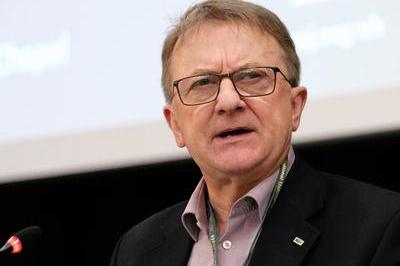
Chris Morley.
© Jess Hurd
Sam Volpe from the NUJ Reach Group Chapel and David Gow, speaking on behalf of the NEC, similarly urged the union to counter attempts by the business lobby to water down the bill. Nick Clark, representing the London Central Branch, supported the motion but argued that “we can’t rely on this government and the Employment Rights Bills to protect us”. Clark called on the union to also continue to campaign strongly on local reporting and pay.
The motion by the NUJ Newsquest Group Chapel, as amended by the Reach Chapel to press for the earliest possible implementation of the bill, passed unanimously.
A motion on food poverty calling on the union to promote and support a campaign seeking for the right to food to be enshrined in law, was debated and carried at conference. Alan Gibson speaking in favour of the motion, said it was important we demand action from governments.
Christina Zaba speaking in favour of the motion for the NEC, said that "hunger hurts, it is painful” and that this pain should not be inflicted on people including children.
Conference heard that the UK government’s decision to make cuts to the Winter Fuel payment will mean some NUJ members are impacted. Composite A included calls to support the National Pensioners’ Convention campaigns and those by other trade unions to have the benefit restored were supported. Niall Mulholland from London Magazine Branch, said “many journalists rely completely or largely on state pensions or benefits."He noted that the UK had one of the highest retirement ages. The composite was carried.
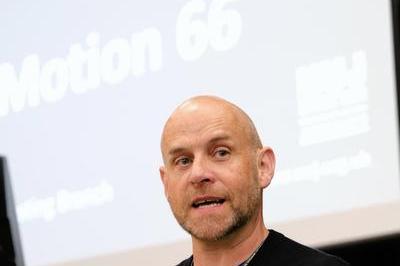
Trevor Keegan
© Jess Hurd
Trevor Keegan speaking from Dublin Broadcasting Branch said there was a need to secure funding for RTÉ, and that a rocky road was being gone down at the moment. Motion 66 called on the NEC to accelerate the NUJ’s campaign for long-term reform of funding of public service broadcasting in Ireland and was carried.
Fran McNulty, NUJ vice president speaking in support of the motion for the NEC, said there was a crisis in the national broadcaster in Ireland. “On the funding crisis around the outdated licence fee model, government asked for a solution to the problem, was told what it was and ignored it.” he said. McNulty said there were proposals to lose 400 of the 1800 employees of RTÉ would be a radical change. He urged support for the motion and noted the NUJ had been at the forefront of campaigning. Motion was carried.
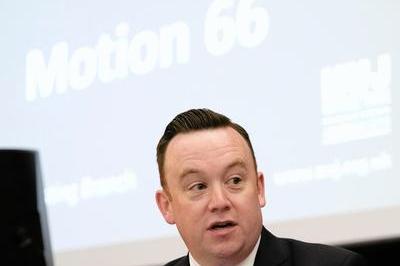
Fran McNulty
© Jess Hurd
Joyce McMillan moving the motion 67 said this was about asking “the Scottish government to do what it said it was going to do in 2021... this is about keeping up the political pressure on our government.”
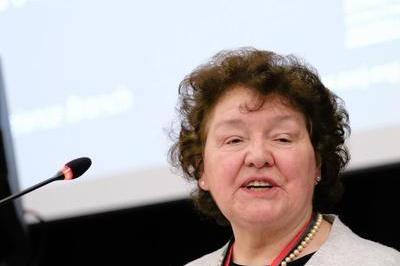
Joyce McMillan
© Jess Hurd
Nick McGowan-Lowe speaking on behalf of the NEC, said “we have to remember that the starting point is that of the seven companies that own the most read Scottish titles, none of them are incorporated in Scotland."
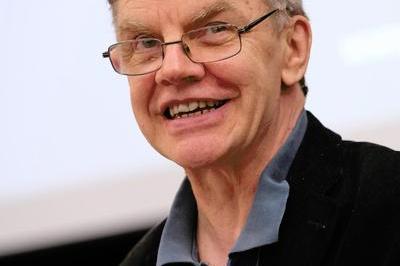
Simon Barrow
© Jess Hurd
Simon Barrow, supporting the motion said there were ethical concerns and that “public interest journalism is about reporting and commentary that provides public accountability for decision making.”
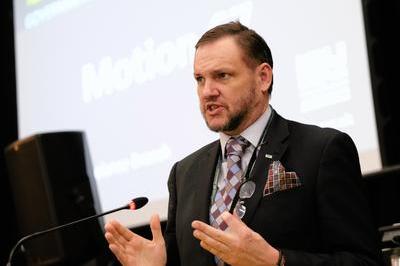
Nick McGowan-Lowe
© Jess Hurd
The motion was carried by conference.
The Irish Executive Council asked for action by the Irish Government by the end of 2025, on how it proposes to promote collective bargaining within the Republic of Ireland
Cearbhall Ó Síocháin, Irish Executive Council, said the Irish government needs to commit to its responsibility and urged support for the Irish Congress of Trade Unions, which has actively been promoting collective bargaining.
Séamus Dooley, NUJ assistant general secretary, who seconded, was critical of the failure of the Irish government to implement the directive, and said "their backsliding is an affront to every worker in Ireland." This motion was carried.
Belfast and District Branch called on the Irish government to engage with the UK authorities to take effective actions to investigate the murder of esteemed branch member Martin O’Hagan 23 years ago. O'Hagan was shot dead by a loyalist gunman near his home in Lurgan, County Armagh, in 2001. Kevin Cooper, Belfast Branch, moved the motion. He said we have lost two colleagues since the signing of the Good Friday Agreement. There were colleagues at home who knew the names of those involved in this ‘heinous murder’. Families are entitled to justice under international law, he said.
Darach McDonald, Derry and North West Branch, backed the motion, and Kathrine Johnston, Belfast and District Branch, supported it too. The motion was unanimously carried.
Belfast and District Branch has welcomed the decision by the British government to hold an independent statutory inquiry into the killing by a loyalist paramilitary group of the human rights lawyer Patrick Finucane in Belfast in 1989.
Michael Fisher, Belfast and District, who spoke on the motion, said he was at the scene of the killing of Pat Finucane in North Belfast and recalled interviewing the murdered man at a local court. He paid tribute to Pat’s widow, Geraldine, who he said has fought a long campaign for a statutory inquiry.
Anton McCabe seconded on behalf of the National Executive Council. He said NUJ members have exposed state collusion; as a union, we stand for the right to know and bring justice to relatives. The motion was carried.
A motion relating to the NUJ press card was raised by Richard Palmer, London Central Branch, who said there had been problems with the London Metropolitan Police not recognising the identification. There is a similar problem for London-based journalists who go to Brussels regularly, he said.
Palmer requested that the NEC lobby the EU to allow people visiting Brussels to have more access.
Cailin Mackenzie, Continental Europe, supported the motion, but pointed out that it can often be complicated to enter events at the EU level unless accredited. The motion was carried unanimously.
